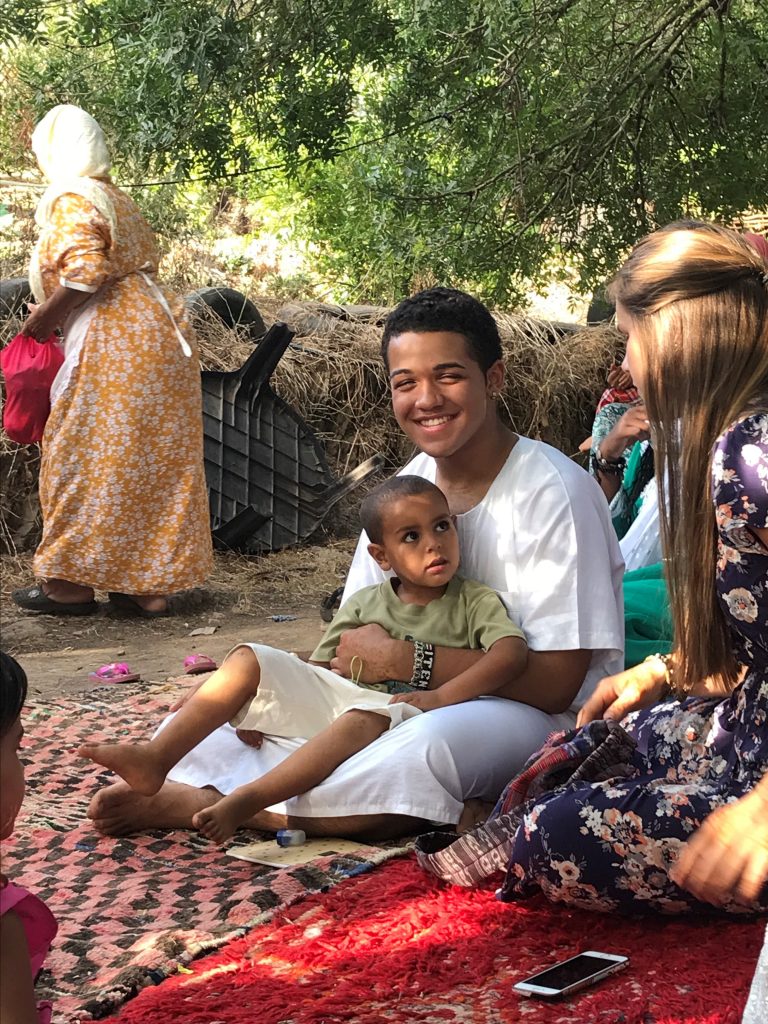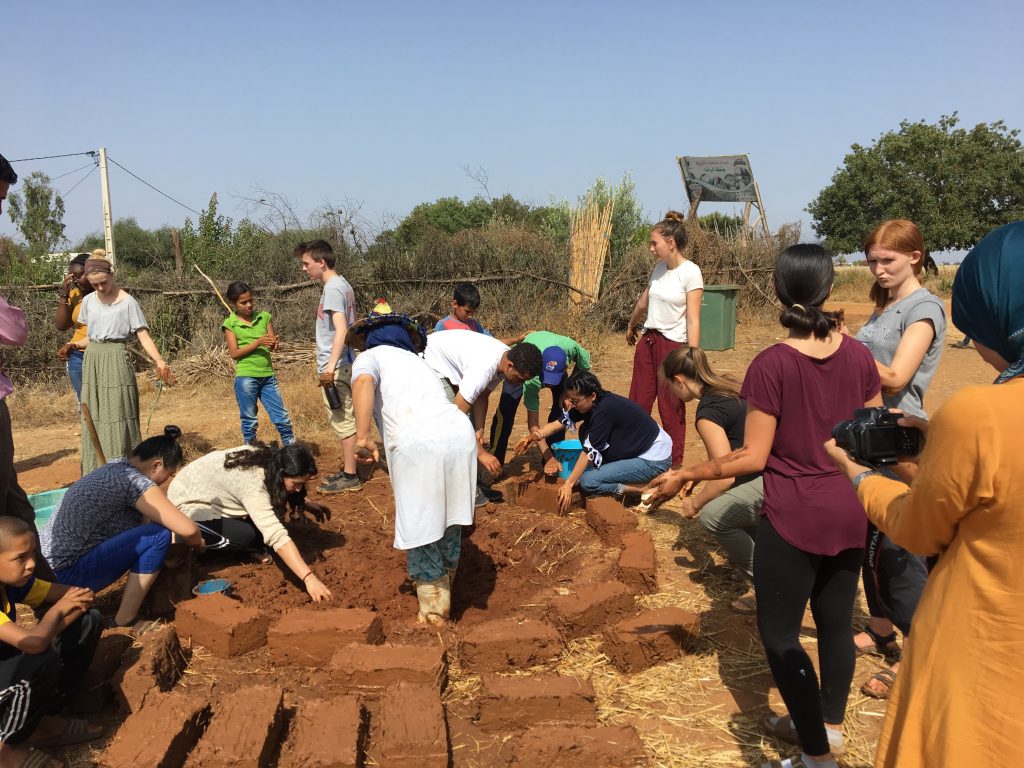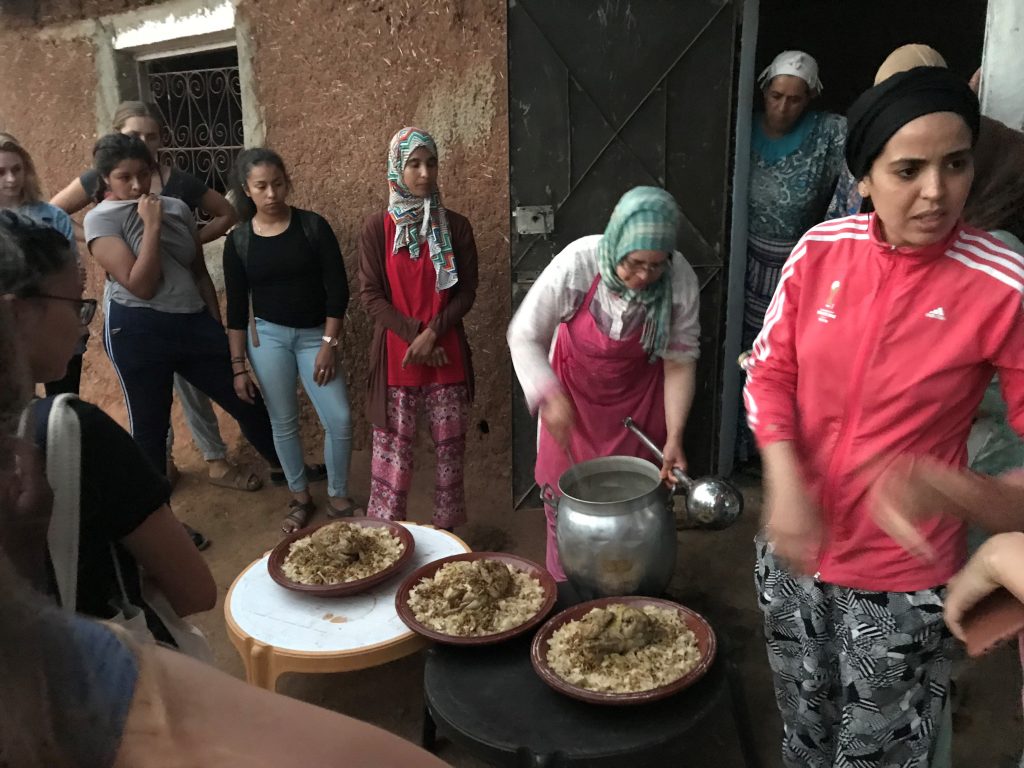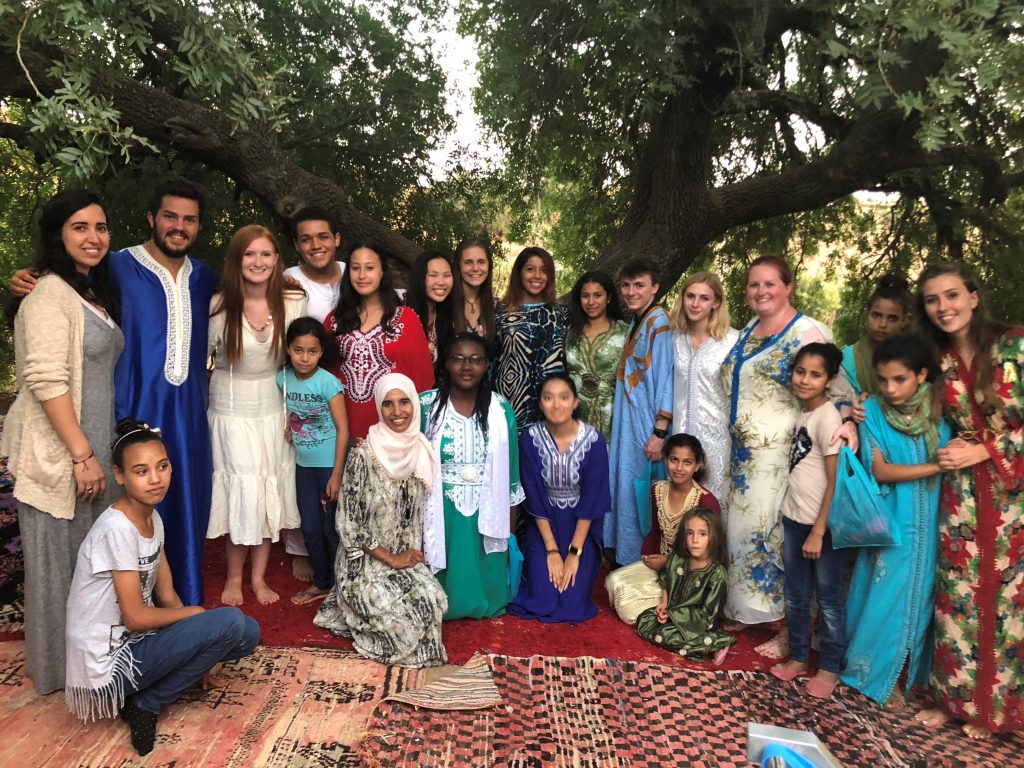
Living in Lambarkyn
Upon first arriving at the village, I had no idea what to expect. The moment I stepped
off the bus our group was welcomed with wide-open arms and sincere smiles. My
home stay family greeted me into their home with delicious food and warm hugs.
We shared plenty of laughs and I enjoyed helping them everyday in their home with
clothes washing, m’simmen making, and tree watering. My time in the village has
taught me many things about life that I had forgotten about in the fast paced world I
live in in America. Being disconnected from my phone and not worrying about social
media has encouraged me to pay close attention to how loving a supportive
community can be. It is beyond peaceful to just spend time enjoying every moment
and cherishing conversations with new people. The community service our group
participated in gave all of us a sense of purpose. We helped mold adobe bricks that
are used to build houses, paint the cooperative where the women cook couscous,
and planted trees throughout the village twice. I have always been told how
important it is to leave a place a little bit better than you found it, and I hope that is
what I have done. I am beyond thankful that I had the opportunity to spend time
here and appreciate a different way of life.
-Jess
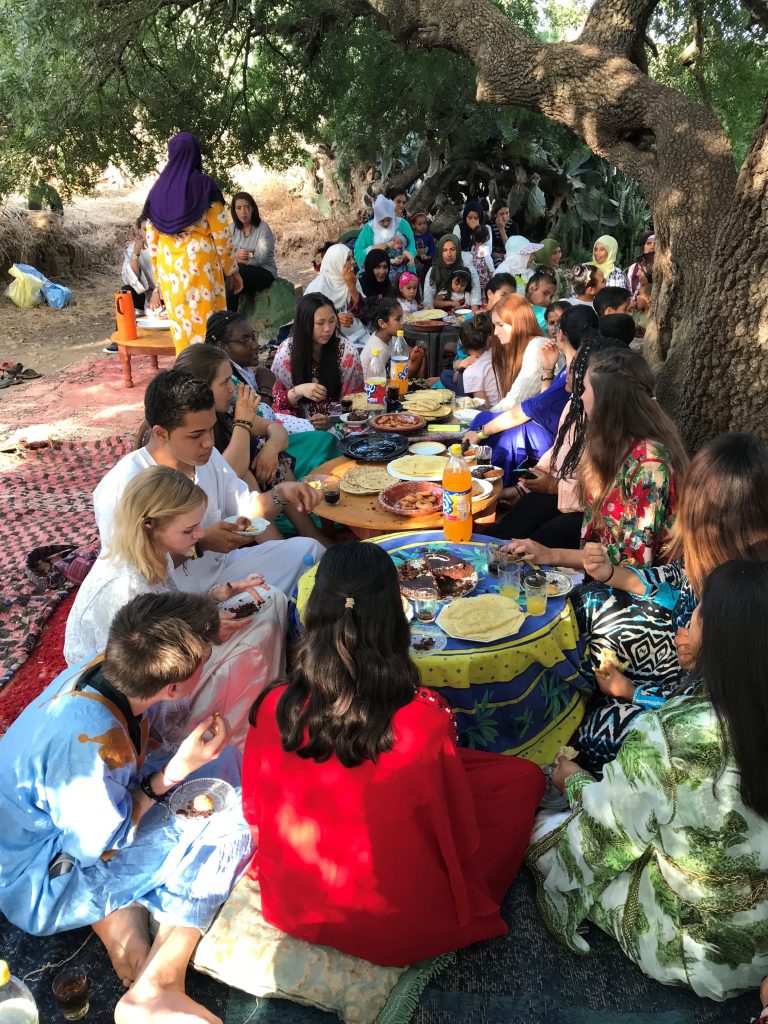
Village life flows at a pace and style completely foreign to us. Afternoon naps are not
a question, but a must in the eyes of many of the villagers. The downtime has gifted
us time to journal, enjoy group games, and play with the children. It has been good
for the entire group to ground ourselves in new ways and things that aren’t
worrying about WiFi or college applications (although we aren’t 100% there yet).
Under the stretching arms of a large, shaded tree, which has become “the tree” we
start our mornings. Most of these mornings begin with weaving. Sitting on the
multitude of brightly weaved carpets spread under “the tree,” the weavers patiently
teach us, a few at a time, the skill that is but second nature to them.
When we first started learning, many of our attempts were met with a “la” or “no” as
we tangled the strings together or missed a string we were supposed to weave.
However, after more weaving and bezef (much) patience, we heard more sounds of
congratulations paired with claps and smiles from the weavers. As we spend more
days with them, the weavers ask us, in the most creative manner in order to escape
the language barrier, about our host families and families back home. They helped
me get my counting in Darija down solid, counting the strings with me as I weaved.
Beyond weaving, we also have the privilege of cooking lessons where we prepare
traditional Moroccan dishes. Our skills are far from those of the women who teach
us, with our M’simmen looking a little lumpier and our vegetables looking wobbly
and thin compared to theirs. Nevertheless, our enthusiastic attempts are met with
matched enthusiasm from the women, excited that we our trying our best. When the
meals are ready, we gather under “the tree” to eat, sharing the meals “family style”
as a group.
One of the women who helps us with the cooking I am lucky enough to call my host
mom. She always makes sure to wave when I pass her at work and tried extra hard
to help me improve my potato peeling skills, which despite her gracious efforts, are
yet to see a vast improvement. She calls me in for lunch with her at work each day
with the other women, where we share breaks together to eat tagine.
The women, both the weavers and the women who help us cook, work at the
Cooperative, an association helping the local women bring in an income and support
the village economy, where the weavers and cooks (who normally cook couscous)
sell their wares. They spare their time to help us, and we cannot be more grateful.
The simple, easy, patience and interactions are not lone to women of the
Cooperative, but we have found are present every day with our families, neighbors,
friends and strangers.
We may not speak perfect Darija, or rather, much Darija at all, but that hasn’t
stopped us from having wonderful times with all the people here. My host sister and
I dance in bed when we wake up, and my family here in Morocco loves to see
pictures of my family back home. We’ve learned as a group that a smile and a quick
salam (hello) can do wonders to brighten a day and many of us say it to each person
we pass in the small village.
Life might be a slower pace here, but we also find it to be a life more kin to
happiness than we have seen before. I know that I, as well as my group mates, will
all take a small piece of this community, in the form of kindness, back to our homes.
-Kiley
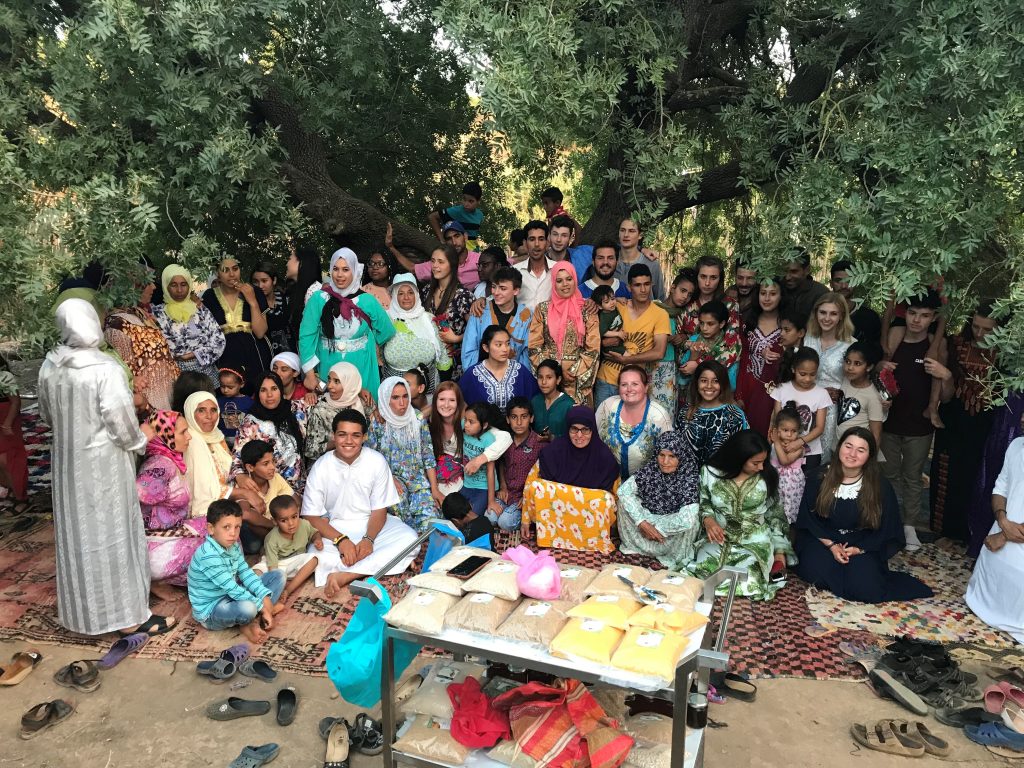
Going into the homestay portion of our trip, I didn’t know what to expect. I knew it
would likely be wildly different from our time staying in hotels in urban areas, but I
didn’t know how. When we began winding around the long mountain roads on our
way to the small village of Bojouda, however, I knew I was in for an experience
unlike anything I’d ever experienced before.
Indeed, as I’d predicted, there were few similarities between our travels throughout
cities like Rabat, Fès, and Marrakech and our time in the village. Gone were the
crowded streets teeming with eager drivers; in their place were slow-moving
donkey carts and the occasional taxi. Instead of enthusiastic vendors on every street
corner, we were met by gentle villagers who spent their days weaving, cooking, or
working in the nearby town of Brechoua. One similarity between our urban and
rural experiences, however, presented itself about a week into our village stay when
we visited the local souk with our host families. The small but bustling market —
filled with everything from fresh produce to Western apparel to newly butchered
livestock — was reminiscent of the medinas we’d visited in the cities, though with a
much stronger sense of community. Everywhere I went throughout the souk with
my host brother, he found someone he knew and greeted them warmly, even if he’d
seen them just the day before. As we passed from shop to shop, I felt a familiar
vibrant energy that has characterized much of our trip throughout the country. In
my time in the souk, I was struck by the ties that bind the rural to the urban, that
bind Rabat to Brechoua, that bind the fast-paced to the relaxed, despite the obvious
differences between them. The theme of our trip is multiculturalism, which we’ve
indeed bore witness to, but I’ve been equally impacted by the similarities that
abound throughout Morocco, no matter where one goes. The high-energy
marketplace seems to me to be a staple of the nation, and one that has helped me —
and, I’d argue, our entire group — to get a meaningful and in-depth look at
Moroccan life and culture.
-Aaron
